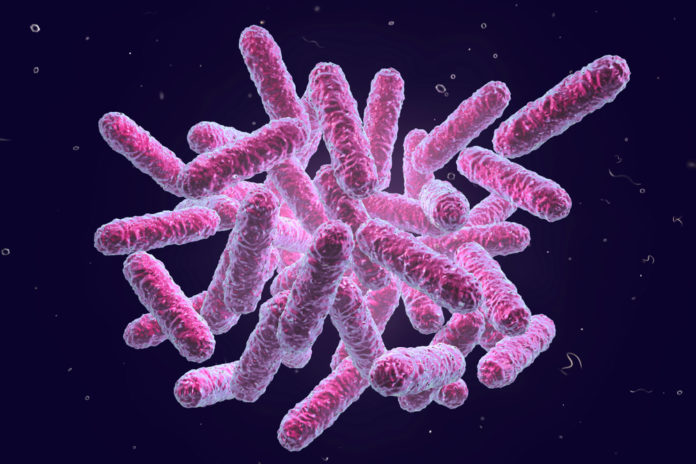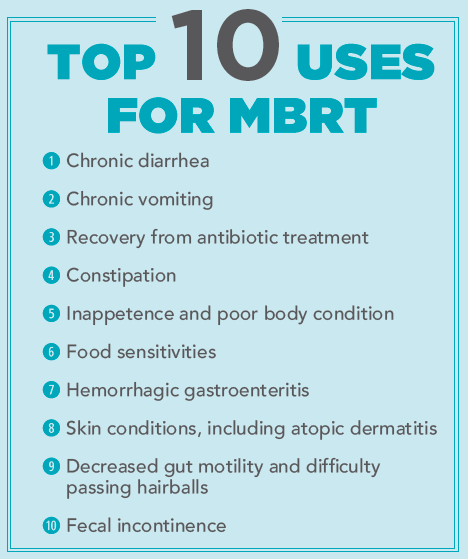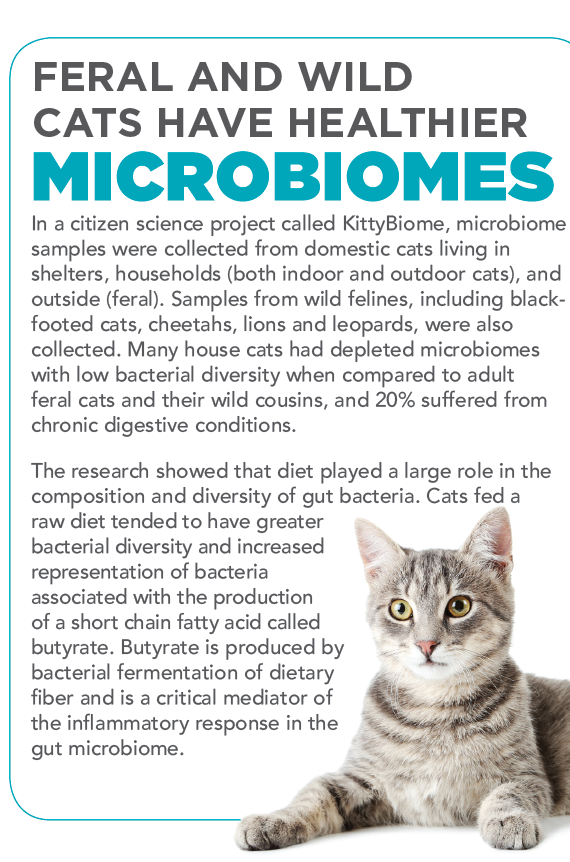Microbiome Restorative Therapy in companion animals

Microbiome Restorative Therapy (MBRT) is a procedure in which fecal material is transferred from a healthy dog or cat to the gastrointestinal tract of an ailing one. It helps balance the microbiome and treat digestive and other health issues.
The microbiome is a community of microorganisms (bacteria, fungi, viruses and other microbes) that occupy a well-defined habitat, such as in or on a dog or cat’s body. Research on the gut microbiome suggests it plays essential roles in immunity, the central nervous system, behavior (including anxiety and depression), skin health, as well as obesity and other metabolic disorders – and, of course, digestion. Microbiome Restorative Therapy (MBRT) is showing a lot of promise in treating digestive and other problems in dogs and cats.
Missing microbes
Mammals are exposed to their first microbes during birth and through breastfeeding. These early life events contribute to each animal having a unique gut microbiome signature. The microbes that are first to arrive in a particular habitat can affect which new species will be able to colonize later on. In other words, these early life events are foundational and will influence a cat or dog’s health for the rest of his life.
A young animal may fail to get the full complement of beneficial microbes if the mother is missing them herself, or if the puppy or kitten is orphaned or weaned too early. Even if a healthy microbiome is established early in life, microbes in the gut will change with age, diet and lifestyle. The gut microbiome may also be depleted or harmed by exposure to broad spectrum antibiotics that kill both harmful and beneficial microbes. The widespread use of antibiotics and antimicrobials may be contributing to increased incidences of conditions such as inflammatory bowel disease (including Crohn’s disease and ulcerative colitis), esophageal reflux, Type 1 diabetes, asthma, and food allergies in human populations.
 Food additives and non-steroidal anti-inflammatory drugs (NSAIDs) have also been shown to alter the composition of the gut microbiome, and may further contribute to the development of chronic digestive conditions in companion animals. The widespread use of antibiotics and other medications may also contribute to why digestive issues are a top reason for veterinary visits in both cats and dogs.
Food additives and non-steroidal anti-inflammatory drugs (NSAIDs) have also been shown to alter the composition of the gut microbiome, and may further contribute to the development of chronic digestive conditions in companion animals. The widespread use of antibiotics and other medications may also contribute to why digestive issues are a top reason for veterinary visits in both cats and dogs.
The growth of MBRT
One approach to rebuilding the gut microbiome is through the use of Microbiome Restorative Therapy (MBRT), a procedure in which fecal material is transferred from a healthy individual to the gastrointestinal tract of an ailing one. Although its use in human medicine has only begun increasing in recent years — particularly in the treatment of Clostridium difficile infections that are not responsive to antibiotics, as well as for Crohn’s disease, ulcerative colitis, constipation and enterocolitis — MBRT (also known as transfaunation or fecal microbiota transplantation (FMT)) has been used in veterinary practice since at least the 18th century for cattle, horses, sheep and other animals suffering from rumination disorders, indigestion and colitis.
Interest in MBRT for small animal practice is growing, particularly for digestive disorders. Despite the work of pioneering integrative veterinarians like Dr. Margo Roman, who has performed over 2,000 MBRT procedures in the past ten years, this therapy is still not widely used in conventional practice; however, a growing number of integrative veterinarians offer MBRT as a way to provide microbial supplementation to patients from a healthy live donor of the same species.
One issue restricting the growth of MBRT in practice is the availability of screened fecal material from healthy donors. To create a bank of carefully-screened fecal material from healthy donors, a variety of factors must be considered. In addition to standard pathogen and parasite screening, donors must have no current or past health concerns, whether physical or behavioral; and they must have no history of systemic antibiotic use. These “golden-poo pets” must also be old enough to have developed a sufficiently diverse microbiome, but young enough for that diversity to still be intact.
How are fecal transplants done?
Fecal transplants may be administered in three ways, often depending on the severity of the dog or cat’s ailment:
- Rectally, via enema and colonoscopy (typically using fresh or frozen material). This method may be needed in more critical cases.
- Orally, via nasoduodenal intubation and enteroscopy (typically using fresh or frozen material).
- Orally, via enteric-coated capsules sold only to veterinarians. The capsules contain pre-screened material prepared with all-natural ingredients that remain stable at room temperature while retaining high viability. Enteric coatings are made of long-chain carbohydrates that prevent capsule contents from being destroyed by stomach acid.
 Why MBRT is effective
Why MBRT is effective
Scientists haven’t even begun describing many of the common organisms living in the microbiomes of healthy dogs and cats. For example, recent research identified more than 20 bacterial strains that are new to science, in a single sample of cat poop. This makes it difficult to develop a supplement that contains the full spectrum of genera found in healthy dogs and cats. Probiotic strains that are not cat- or dog-specific may be helpful for controlling clinical signs of disease, but will not typically colonize the host. This means they must be given continuously in order to see an effect.
MBRT, on the other hand, provides a “complete package” because it reflects the abundance of bacteria, fungi and bacteriophages in the relative ratios found in a healthy animal. As time goes on, we’ll no doubt see this therapy being used more in the treatment of a range of issues in dogs and cats.
For more information, visit AnimalBiome.com or mashvet.com.
Case report – MBRT for IBD
Laila, an active boxer mix, was the picture of health until she turned five. Over the course of just a few months, she developed severe diarrhea and vomiting. She was given antibiotics, antacids, probiotics and prescription diets, but nothing seemed to alleviate her symptoms and she continued to worsen.
After an official IBD diagnosis, she began a high daily dose of prednisone in addition to her other medications. Her diarrhea temporarily resolved, but after lowering the prednisone dosage to minimize side effects, Laila relapsed. She once again developed watery diarrhea, and it was not alleviated even after significantly increasing the prednisone dosage. Instead of resolving her digestive issues, in fact, the prednisone increase prompted an onset of medication-induced Cushing’s disease, turning this once energetic muscular dog into a frail low-energy one. Despite the steroid, her digestive issues persisted.
Finally, Laila was tried on oral Gut Restoration capsules for MBRT. Slowly, the consistency of her feces changed from a yellowish liquid to a healthy brown solid, and she has since been tapered off all prescription medications. Most importantly, her health and happiness have improved beyond measure.



